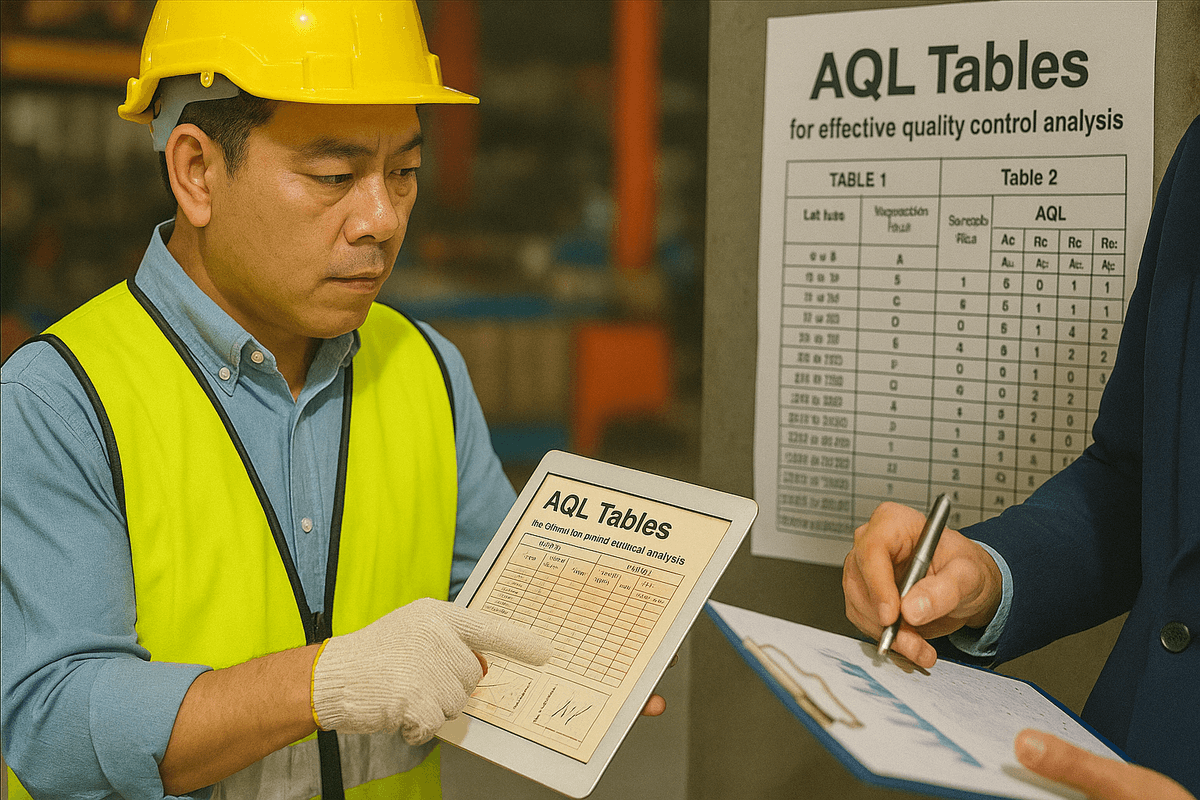Introduction

In today's competitive marketplace, understanding why quality control is important is crucial for businesses striving to maintain high standards and satisfy customer demands. Quality control (QC) ensures that products meet established specifications and requirements, ultimately leading to enhanced customer trust and loyalty. Without effective quality management systems in place, companies risk damaging their reputation and losing market share.
Understanding Quality Control Importance
Quality control plays a vital role in the production process by identifying defects before products reach consumers. By implementing robust QC measures, companies can significantly reduce costs associated with returns and rework, thereby improving profitability. Furthermore, understanding why quality control is important allows organizations to foster a culture of excellence that resonates throughout every level of the business.
Quality Control vs. Quality Assurance
While often used interchangeably, quality control and quality assurance are distinct concepts that serve different purposes within an organization's quality management framework. Quality control focuses on identifying defects in finished products through inspection and testing, whereas quality assurance emphasizes preventing defects through systematic processes and standards. Recognizing the differences between these two approaches helps businesses optimize their strategies for achieving consistent product quality.
The Role of Quality Management
Quality management encompasses both quality control and quality assurance as part of a comprehensive strategy to enhance product offerings continually. It involves defining quality standards, monitoring performance metrics, and implementing continuous improvement initiatives that drive operational efficiency. By prioritizing effective quality management practices, organizations can not only boost customer satisfaction but also position themselves as leaders among successful QC companies.
What Is Quality Control?

Quality control (QC) is a systematic process aimed at ensuring that products or services meet specified quality standards. It plays a pivotal role in maintaining the integrity of production processes and enhancing customer satisfaction. Understanding why quality control is important can help businesses not only meet regulatory requirements but also foster a culture of continuous improvement.
Defining Quality and Its Impact
To define quality, one must consider the degree to which a product or service meets customer expectations and requirements. Quality impacts every facet of a business, from production efficiency to customer loyalty, directly influencing profitability and market position. When companies prioritize quality management, they create products that resonate with consumers, ultimately leading to increased sales and brand reputation.
Historical Context of Quality Control
The concept of quality control has evolved significantly over the past century, transitioning from simple inspection processes to comprehensive quality assurance systems. In the early 20th century, pioneers like Walter Shewhart introduced statistical methods for quality improvement in manufacturing settings. Today’s QC practices are informed by this historical context, emphasizing proactive measures rather than reactive fixes—showing just how crucial understanding why quality control is important can be for modern businesses.
Key Concepts in Quality Management
Several key concepts underpin effective quality management strategies that organizations must embrace for successful QC implementation. These include Total Quality Management (TQM), Six Sigma methodologies, and continuous improvement principles—all aimed at eliminating defects and enhancing overall performance. By integrating these concepts into their operations, businesses can better understand how to maintain high standards while simultaneously addressing challenges in their production processes—thus illustrating the vital link between effective QC practices and long-term success.
Quality Assurance and Its Benefits

Quality assurance (QA) is often mistaken for quality control (QC), but understanding their differences is crucial for effective quality management. While QC focuses on identifying defects in finished products, QA emphasizes preventing defects through process improvements. This distinction highlights why quality control is important: it ensures that the end product meets established standards while fostering a culture of continuous improvement.
Differentiating Quality Assurance from Quality Control
To define quality in the context of QA and QC, one must recognize that quality assurance involves systematic processes and procedures designed to guarantee that products are developed correctly from the outset. In contrast, QC acts as a final checkpoint to catch any issues before products reach consumers. By distinguishing these two concepts, businesses can better implement strategies that enhance both their QC and overall quality management practices.
Quality assurance plays a pivotal role in elevating product standards by instilling best practices throughout the production process. This proactive approach not only minimizes defects but also reduces the need for extensive QC measures later on. Ultimately, defining clear roles for QA and QC helps organizations maintain high-quality outputs while streamlining operations.
How Quality Assurance Enhances Products
Implementing robust quality assurance processes leads to significant enhancements in product offerings, making them more reliable and appealing to customers. When companies prioritize QA, they can identify potential issues early in production, leading to fewer recalls or customer complaints—an essential aspect of why quality control is important for maintaining brand integrity. The result? Products that not only meet expectations but often exceed them.
Moreover, effective QA fosters innovation by encouraging teams to explore new methodologies without compromising on standards. This drive for improvement aligns perfectly with ongoing trends in quality improvement across industries, ensuring that businesses remain competitive while delivering top-notch products consistently. As a result, companies adopting strong QA practices often see an uptick in customer loyalty and market share.
The Link Between Quality Assurance and Customer Satisfaction
The relationship between quality assurance and customer satisfaction cannot be overstated; when customers receive high-quality products consistently, they are more likely to become repeat buyers. By investing in comprehensive QA programs, companies can establish trust with their clientele—an invaluable asset in today’s competitive landscape where consumer choices abound. Understanding why quality control is important helps businesses appreciate how effective QA directly contributes to positive customer experiences.
Furthermore, satisfied customers often become advocates for brands they trust, leading to organic growth through word-of-mouth recommendations—a powerful marketing tool that no amount of advertising can replicate. Companies recognized as leaders among QC companies benefit tremendously from this dynamic; their commitment to excellence resonates with consumers who value reliability over gimmicks or fleeting trends. Thus, prioritizing both QA and QC ultimately lays the groundwork for sustained success.
The Impact of Quality Control on Businesses

Quality control is not just a buzzword; it’s a critical component that can significantly influence a business’s bottom line. When companies implement effective quality management systems, they can reduce waste, minimize defects, and enhance overall operational efficiency. This leads to increased profitability, proving why quality control is important in today’s competitive market.
How Quality Control Affects Profitability
The direct correlation between quality control and profitability cannot be overstated. By defining quality standards and adhering to them through rigorous qc quality control processes, businesses can cut costs associated with rework and returns. Furthermore, when customers receive high-quality products consistently, their loyalty increases, leading to repeat purchases and enhanced revenue streams.
The Reputation Boost from Quality Control
A robust quality management system not only improves products but also elevates brand reputation. Companies known for their commitment to quality assurance often enjoy a competitive edge; consumers are more likely to trust brands that prioritize consistent excellence in their offerings. This reputation boost translates into higher customer retention rates and attracts new clients who value reliability—demonstrating why quality control is important for long-term success.
Case Studies of Successful Quality Control Companies
Several companies exemplify the benefits of effective quality control practices in action. For instance, Toyota has built its empire on the principles of lean manufacturing and continuous improvement through rigorous qc quality control methods that minimize waste while maximizing efficiency. Similarly, Apple’s stringent focus on defining quality has helped it maintain its status as an industry leader by ensuring that every product meets high standards before reaching consumers—showcasing how vital these strategies are for thriving in the marketplace.
Quality Improvement Strategies

In the ever-evolving landscape of business, quality improvement strategies are essential for maintaining a competitive edge. Understanding why quality control is important enables organizations to refine their processes and enhance their products consistently. By integrating quality management practices into daily operations, companies can foster an environment where continuous improvement thrives.
Implementing Continuous Quality Improvement
Continuous Quality Improvement (CQI) is a systematic approach that focuses on enhancing processes and outcomes over time. By defining quality in measurable terms, organizations can identify areas needing improvement and implement effective solutions. This cycle of assessing performance, making adjustments, and evaluating results not only bolsters product quality but also reinforces the importance of quality assurance throughout the organization.
Moreover, CQI emphasizes the involvement of all employees in the process, ensuring that everyone understands their role in maintaining high standards. When teams are engaged in monitoring and improving processes, they develop a sense of ownership that translates into better output and customer satisfaction. Ultimately, implementing CQI means embracing a culture where quality control and continuous enhancement become second nature.
Tools and Techniques for Quality Improvement
To effectively drive quality improvement initiatives, businesses can employ various tools and techniques tailored to their specific needs. Techniques such as Six Sigma or Lean methodologies focus on reducing waste while improving efficiency—both crucial components of effective quality management. Utilizing statistical process control (SPC), root cause analysis (RCA), and failure mode effects analysis (FMEA) provides valuable insights into how to optimize production processes.
Moreover, software solutions designed for QC can streamline data collection and analysis, allowing companies to make informed decisions based on real-time information. These tools not only help define quality metrics but also facilitate ongoing assessments necessary for long-term success in quality control companies across diverse industries. The right combination of tools empowers teams to tackle challenges head-on while reinforcing why quality control is important within their organizational framework.
The Role of Employee Training in Quality Control
Employee training plays an indispensable role in fostering an environment focused on excellence through effective QC practices. Training programs should emphasize the significance of both quality assurance and control by equipping employees with the skills needed to uphold high standards consistently. When workers understand how to define quality within their specific roles, they become more adept at identifying potential issues before they escalate.
Furthermore, regular training sessions reinforce best practices while introducing new techniques that adapt to evolving market demands—ensuring that teams remain agile amid changes in industry standards or consumer expectations. Investing in employee development not only enhances individual performance but also contributes significantly to overall organizational success by solidifying a shared commitment to maintaining exceptional product standards. In this way, training becomes a cornerstone for cultivating a culture where everyone recognizes why quality control is important.
Real-World Examples of Quality Control
When it comes to quality control, some companies truly stand out as paragons of excellence. Their practices not only define quality but also illustrate why quality control is important in maintaining a competitive edge. Let's delve into how industry leaders like Toyota and Apple, along with insights from China Inspection Pro, exemplify effective quality management.
How Toyota Implements Quality Control
Toyota is often heralded for its robust approach to quality control, famously known as the Toyota Production System (TPS). This system emphasizes continuous improvement and respect for people, ensuring that every employee plays a role in maintaining high standards. By integrating quality assurance into every stage of production, Toyota effectively defines quality and minimizes defects, which ultimately boosts profitability.
One key aspect of Toyota's QC strategy is the use of the Andon system—an innovative tool allowing workers to halt production if they spot an issue. This immediate feedback loop fosters a culture where everyone is accountable for their work's quality. As a result, Toyota not only enhances product reliability but also reinforces why quality control is important within its organizational ethos.
Apple's Quality Management Practices
Apple’s approach to quality management reflects its commitment to excellence across all products—from iPhones to MacBooks. The company employs rigorous testing protocols and meticulous design processes that define quality at every touchpoint in the customer experience. By prioritizing both product aesthetics and functionality, Apple ensures that their offerings resonate with consumers while reinforcing the importance of continuous improvement.
Moreover, Apple’s dedication to supplier relationships plays a crucial role in its overall QC strategy. The company actively collaborates with suppliers to ensure they meet stringent standards through regular audits and assessments—showcasing how intertwined quality assurance and control are in their operations. This synergy not only enhances product integrity but also illustrates why quality control is important for brand reputation.
Insights from China Inspection Pro on Quality Control
China Inspection Pro offers valuable insights into effective QC practices tailored for businesses sourcing products from China. They emphasize that defining quality goes beyond mere compliance; it involves understanding client needs and market demands thoroughly. By providing comprehensive inspection services throughout the supply chain, they help companies uphold high standards while navigating common pitfalls associated with international manufacturing.
Their focus on proactive measures—such as pre-production inspections—illustrates how adopting strategic QC practices can lead to significant improvements in product outcomes. Companies partnering with China Inspection Pro gain access to tools that enhance their overall quality management framework while mitigating risks associated with subpar products entering markets. Ultimately, these insights reinforce why quality control is important in sustaining business growth and customer satisfaction.
Conclusion

Quality control is often the unsung hero in the world of business, playing a critical role in ensuring that products meet defined standards and customer expectations. Understanding why quality control is important goes beyond just maintaining product integrity; it directly influences customer satisfaction, brand loyalty, and ultimately profitability. Companies that prioritize quality management create a culture of excellence, making it essential for long-term success.
The Critical Role of Quality Control
Quality control serves as the backbone of any successful organization by systematically monitoring processes to ensure they produce goods that meet established criteria. This proactive approach helps define quality not just in terms of specifications but also through customer perception and experience. In an era where consumers are increasingly discerning, companies that invest in robust quality control practices stand out from their competitors.
Ensuring Market Competitiveness Through Quality
In today's fast-paced market, ensuring market competitiveness through quality is more vital than ever. Businesses leveraging effective quality assurance and qc quality control strategies can respond swiftly to changing consumer demands while minimizing waste and inefficiencies. This agility not only boosts profitability but also enhances reputation; customers are more likely to choose brands known for their commitment to high-quality products.
Future Trends in Quality Management Solutions
As we look ahead, future trends in quality management solutions will likely focus on integrating advanced technologies like AI and machine learning into traditional qc quality control frameworks. These innovations promise to enhance data analysis capabilities, allowing businesses to predict potential issues before they arise—making preventive measures a reality rather than an afterthought. Moreover, as sustainability becomes a key concern for consumers, companies will need to adapt their quality improvement strategies accordingly to align with eco-friendly practices while maintaining high standards.
